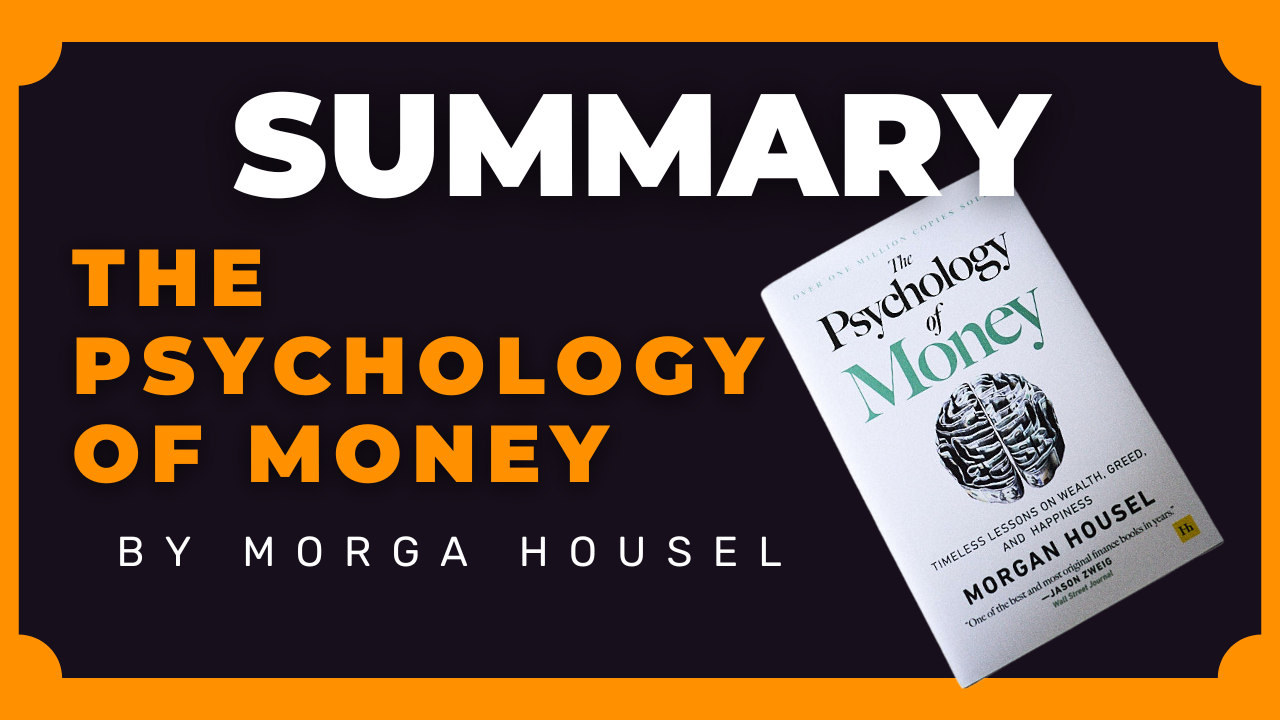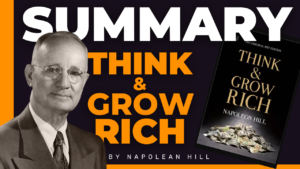If you are looking for a complete, easy-to-understand, and fast book summary of The Psychology of Money by Morga Housel then you’ve come to the right place.
Below you will find our full audio/video 5 minute summary of the book which outlines all the key points, must learn lessons, and talking points.
Ad Block
Page Contents
Watch Or Listen To Our Complete 5-Minute Book Summary of The Psychology Of Money Below
Morga Housel’s Book Is a Must Any Entrepreneur Looking To Start A New Business…
Prefer Reading, Here Is A Transcript Of The Psychology Of Money Book Summary
THE PSYCHOLOGY OF MONEY by Morgan Housel
Intro
Welcome to our 5-minute detailed summary of “The Psychology of Money”, by Morgan Housel, by the end of this short book summary you will not only understand the big ideas and key takeaways from the book, you’ll be able to discuss and implement them as well. Make sure to subscribe and hit the bell icon if you want to learn from the world’s greatest business and finance books in a fraction of the time moving forward. Also comment I subscribed below and we will do our best to thank you!
Main body
Money is the thing you need the most. Most of the time we are struggling with making money and maintaining it. Many people think that you need to come from money or inherit it to every become rich. Many of you think only the people who get it in inheritance are the richest, but that is not the truth, money can be your niche too, all you need is to understand the psychology of money.
Our finances play a huge role in our lives, it wouldn’t be overstated to say that our lives revolve around our expenses. However, most of us have never tried to understand the relation between expenses and money. As Housel mentions, doing well with money is not about what you know about it, it is about how you behave. Moreover, changing behaviors is challenging even for the super smart ones.
“Money’s greatest intrinsic value—and this can’t be overstated—is its ability to give you control over your time. Use the money to gain control over your time, because not having control of your time is such a powerful and universal drag on happiness.” Morgan Housel
This is the favorite author quote from the book. As the title mentions, The Psychology of Money [-investigates how money moves in an economy and how personal biases and emotional factors influence our financial decisions, as well as how to think more rationally and make better financial decisions. In the book, Morgan Housel shares 19 unique stories that show different perspectives of people regarding money that are meant to teach a new lesson in each story.
Here are some key takeaways the book focuses on:
That theory is not reality
Reality is far different than theory. We do learn about stocks and past money experiences, but reading about an event and facing it are two different things.
Luck and risk
Calculating every risk and countering each problem never guarantees success. Sometimes even the most well-written and executed plan fails to deliver and sometimes a bad decision can turn out great. So, luck is real, but if you end up on the wrong side of risk, be kind to yourself, it is not always your fault.
Don’t compare
You set a goal and achieve it and then you set a higher one, and the circle goes on and on. This is because you are comparing yourself to someone ahead of you. There will always be someone with more money than you, no matter how much you make. and it is ok to make more but never take risks that can gamble all you have for something you cannot have.
Invest in something
We spend money way more than we should, and an easy way to control this is to invest the money in low-cost index funds. This will increase the value of your money compared to keeping it liquid which can be subjected to inflation infiltration.
Nevertheless, investing is not fun, it takes more than just money:
“Like everything else worthwhile, successful investing demands a price. But its currency is not dollars and cents. It’s volatility, fear, doubt, uncertainty, and regret – all of which are easy to overlook until you’re dealing with them in real time.” Morgan Housel.
Differentiate between getting money and keeping money
Getting money is putting yourself at risk, taking important decisions, and working hard. Whereas, keeping money involves a sense of fear, frugality, budgeting, and avoiding getting greedy. You need to steer your way through the getting and keeping money game.
Peak of wealth
Housel defined the highest form of wealth as:
“The ability to do what you want, when you want, with who you want, for as long as you want, is priceless. It is the highest dividend money pays.”
Don’t fool yourself with brands
You think buying branded clothes, huge mansions, and fancy cars will multiply your respect and admiration, well it is not the case. It is the thing that gets admired, not you. So, if you wanna buy them for yourself, buy them in a number or amount that is feasible for you.
Make space for the future
When you are planning long-term, you think things will go as planned. However, this never happens, you might face a terminal illness, a natural disaster, or have kids. You need to make some room for the unknown the future holds.
Pessimism is the key
When something isn’t going well, it’s easy to believe that it will continue to go wrong. That appears to be very credible. However, this way of thinking fails to recognize that issues commonly help improve efficiency for change and solutions. In addition, this inspires ingenuity, which results in changes that only the most optimistic may believe in.
Outro
This is it for today, if you want to learn in-depth about the money attitude you should buy The Psychology of Money by Morgan Housel. You can pick it up with the affiliate links below. We will return with more book summaries soon; in the meantime, please like and subscribe to our channel. Remember to click the bell icon to be notified when a new video is added. Let us know in the comments if there is a book you want us to summarize! And until next time, I hope your financial success surpasses your dreams!
Until next time, ADIOS!





